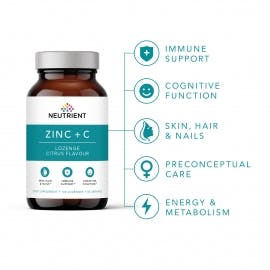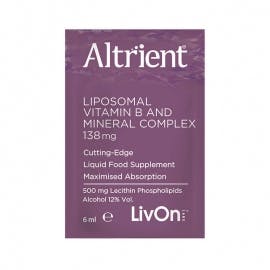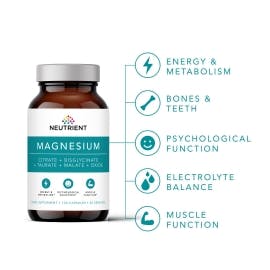Back To School – Health Tips
Written by: Jacqueline Newson BSc (Hons) Nutritional Therapy
After a long busy summer, it's that time of year again, when many parents wave their children off to join a new term at school, college or even university. The new school year brings a mix of feelings, excitement and fresh opportunities, but sometimes a little stress for both children and parents, so what can you do to support them physically and mentally for the months ahead?
Good nutrition is the best place to start; it plays a vital role in all aspects of brain function, growth spurts and immune health and if you’ve got that under control, you have one less thing to worry about! So let’s dive into some useful advice:
How To Keep Kids Healthy During School Term
Classrooms can be a hotspot for seasonal infections, especially during autumn and winter, which makes it vital to build strong immune defences. Encouraging children to spend time outdoors can help maintain vitamin D levels and support overall immune health. Additionally, a balanced diet full of colourful fruit and vegetables, whole grains, lean proteins and healthy fats lays the foundation, while focusing on certain nutrients provides extra support.
- Vitamin C - contributes to normal immune function and protects cells from oxidative stress.1 Fill up lunch boxes with a good range of fruit and veggies like berries, peppers, kiwi, citrus, and broccoli.
- Zinc - supports immune defence. Studies have shown that zinc intake has a positive influence on the duration of colds and other illnesses.2 Dietary zinc sources include seafood, pumpkin seeds and lentils.
- Vitamin D - is often lacking during the darker months. It contributes to normal immune function and works alongside vitamin K2 to support bone health. ³ Make sure your children get regular portions of oily fish, eggs and fortified foods around wintertime.
- Probiotics and fibre-rich foods - help maintain a balanced gut microbiome, which plays a central role in immune resilience.⁴ Daily helpings of live yoghurt, kefir, sauerkraut and wholegrains help to keep beneficial bacteria thriving.
Give Your Children a Head Start
Children, teenagers and young adults need a steady supply of fuel and key nutrients in order to maintain concentration levels and sustain energy. Studies show that children who eat breakfast perform better academically than those who skip it.⁵ To keep concentration sharp and blood sugar levels stable, ensure your child has a balanced breakfast combining protein and complex carbohydrates. Try starting their day with overnight oats, nuts and berries, scrambled eggs on wholegrain toast, or muesli with yogurt and fruit.
Tackle Teen Nutrition
Nutritional demands increase around puberty, as the adolescent body undergoes physical changes during a period of rapid growth and development. But, whilst diet should be the foundation of good health at this time, nutrition isn’t a priority for most teenagers and young adults, which is why it pays to keep a close eye on their diet.
The UK National Diet and Nutrition Survey shows that a substantial proportion of teenage girls have low intakes of certain nutrients, most often vitamin A, riboflavin (vitamin B2), iron, calcium and folate, with an increased risk of vitamin D deficiency in both boys and girls. 6 National survey results also show that adolescent intakes of saturated fatty acids, salt and added sugars are above recommended levels.
This makes a nutrient-rich diet, with minimal processed snacks, an important focus during the school and university years. In addition to healthy eating habits, these supplements to support focus and learning may provide extra support:
- B Complex vitamins - are essential for energy metabolism and nervous system support. 7 A diet rich in whole grains, leafy greens, poultry, and legumes is vital for all that brain power! If you know your teen won’t get enough of these staples, a highly bioavailable B complex supplement can help to bridge nutritional gaps.
- Magnesium - contributes to normal psychological function, aids energy metabolism and helps reduce tiredness and fatigue.8 Including nuts, seeds, leafy greens, and whole grains helps to counter the moody blues. Supplementing with a well-absorbed chelated form of magnesium may be helpful with children who sometimes struggle to keep up.
- Omega-3 fatty acids - are vital for brain development and learning. Research has shown that higher blood levels of the omega-3 DHA are linked to better reading ability and concentration in children.9 Oily fish is a great source of omega-3s, but for fussy kids (or vegans), walnuts, flax seeds, chia seeds or supplements are an excellent alternative.
- Vitamin C - also supports normal psychological function, while aiding energy metabolism and reducing fatigue,10 making it a valuable nutrient during busy school and university schedules. Liposomal vitamin C sachets are highly bioavailable and handy to carry on the go.
Lunchbox Nutrition Tips For Children
What children and teens eat at school can make a real difference to their focus, energy, and mood throughout the day. Filling their lunch boxes with a balance of nutrient-rich foods helps maintain steady blood sugar levels, keeping young learners alert and ready to absorb new information.
- Balanced meals: Pair protein (chicken strips, boiled eggs, hummus, tofu, cheese, prawns) with complex carbohydrates (wholegrain wraps, brown rice salads, oatcakes) and colourful vegetables or fruit.
- Brain foods: Add omega-3-rich options such as salmon, mackerel, or a small pot of chia pudding topped with chopped walnuts to support concentration and memory.
- Immune-enhancing snacks: Include vitamin C-rich fruits like kiwi, berries, or orange slices alongside zinc-containing seeds. (Pack a small pot of toasted pumpkin and sunflower seeds).
- Hydration counts: Encourage water over sugary drinks to support focus and reduce energy crashes. Fizzy water flavoured with cucumber or lemon and ginger usually goes down well.
- Smart swaps: Replace sugary snacks with nutrient-dense choices, i.e., oat bars sweetened with dried fruit, veggie sticks with guacamole, yoghurt topped with nuts and seeds, and celery sticks filled with nut butter.
Back To School Stress Support For Parents
Back-to-school isn’t just about the kids; parents have to juggle busy routines too. A nutrient-rich diet can keep anxiety at bay, support resilience and maintain focus for all that multi-tasking!
- Magnesium (nuts, seeds, leafy greens, wholegrains) plays an important role in psychological well-being and muscle function, which can be important during times of stress. 11 Studies have explored how magnesium supplementation affects stress and mood, with some reporting positive effects on well-being. 12
- B vitamins (whole grains, legumes, nuts) support the nervous system and energy metabolism. 13
- Curcumin, the active compound in turmeric, has been researched for its effects on cognitive function and is also being explored for its role in supporting resilience and managing inflammation. 14
- Daily lifestyle practices such as gentle exercise, regular sleep, and mindful breathing complement nutritional support and help parents stay balanced.
Prioritising simple lifestyle habits like outdoor pastimes, together with balanced meals, quality sleep and smart use of supplements provides a practical pathway to back-to-school wellness and allows the whole family to thrive.
Edited by: Alejandra Toro, Pshychologist, MSc Nutrition and Behaviour
References
- EFSA Panel on Dietetic Products, Nutrition and Allergies (NDA). EFSA Journal 2010;8(10):1815.
- Science M, et al. "Zinc for the treatment of the common cold in children and adults." Cochrane Database Syst Rev. 2013;6:CD009364.
- EFSA Panel on Dietetic Products, Nutrition and Allergies (NDA). EFSA Journal 2009;7(9):1228.
- Belkaid Y, Hand TW. "Role of the microbiota in immunity and inflammation." Cell. 2014;157(1):121–41.
- Adolphus K, et al. "The effects of breakfast on behaviour and academic performance in children and adolescents." Front Hum Neurosci. 2013;7:425.
- Public Health England & Food Standards Agency. "National Diet and Nutrition Survey: Results from Years 9 to 11 (2016/2017 to 2018/2019)."
- EFSA Panel on Dietetic Products, Nutrition and Allergies (NDA). EFSA Journal 2009;7(9):1209.
- EFSA Panel on Dietetic Products, Nutrition and Allergies (NDA). EFSA Journal 2009;7(9):1216.
- EFSA Panel on Dietetic Products, Nutrition and Allergies (NDA). EFSA Journal 2009;7(9):1216.
- Richardson AJ, Montgomery P. "The Oxford–Durham study: A randomized, controlled trial of dietary supplementation with fatty acids in children with developmental coordination disorder." Pediatrics. 2005;115(5):1360–6.
- Carr AC, Maggini S. "Vitamin C and immune function." Nutrients. 2017;9(11):1211.
- Boyle NB, et al. "The effects of magnesium supplementation on subjective anxiety and stress—A systematic review." Nutrients. 2017;9(5):429.
- EFSA Panel on Dietetic Products, Nutrition and Allergies (NDA). EFSA Journal 2009;7(9):1209.
- Hewlings SJ, Kalman DS. "Curcumin: A review of its effects on human health." Foods. 2017;6(10):92.






